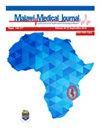Effect of an educational programme on critical care nurses' competence at two tertiary hospitals in Malawi
IF 1.2
4区 医学
Q4 PUBLIC, ENVIRONMENTAL & OCCUPATIONAL HEALTH
引用次数: 3
Abstract
Background Critical care specialty deals with the complex needs of critically ill patients. Nurses who provide critical care are expected to possess the appropriate knowledge and skills required for the care of critically ill patients. The aim of this study was to assess the effect of an educational programme on the competence of critical care nurses at two tertiary hospitals in Lilongwe and Blantyre, Malawi. Methods A quantitative pre- and post-test design was applied. The training programme was delivered to nurses (n = 41) who worked in intensive care and adult high dependency units at two tertiary hospitals. The effect of the training was assessed through participants' self-assessment of competence on the Intensive and Critical Care Nursing Competence Scale and a list of 10 additional competencies before and after the training. Results The participants' scores on the Intensive and Critical Care Nursing Competence Scale before the training, M = 608.2, SD = 59.6 increased significantly after the training, M = 684.7, SD = 29.7, p <.0001 (two-tailed). Similarly, there was a significant increase in the participants' scores on the additional competencies after the training, p <.0001 (two-tailed). Conclusion The programme could be used for upskilling nurses in critical care settings in Malawi and other developing countries with a similar context.教育方案对马拉维两家三级医院重症监护护士能力的影响
背景重症监护专业处理危重病人的复杂需求。提供重症护理的护士应具备护理重症患者所需的适当知识和技能。本研究的目的是评估教育计划对马拉维利隆圭和布兰太尔两家三级医院重症监护护士能力的影响。方法采用定量试验前后设计。培训方案提供给了在两家三级医院重症监护室和成人高依赖病房工作的护士(n=41)。通过参与者在重症监护和危重症护理能力量表上的能力自我评估以及培训前后的10项额外能力清单,评估了培训的效果。结果参与者在培训前的重症监护和危重症护理能力量表上的得分,M=608.2,SD=59.6,在培训后显著增加,M=684.7,SD=29.7,p<.0001(双尾)。同样,在训练后,参与者在额外能力方面的得分显著增加,p<.0001(双尾)。结论该方案可用于提高马拉维和其他具有类似背景的发展中国家重症监护环境中护士的技能。
本文章由计算机程序翻译,如有差异,请以英文原文为准。
求助全文
约1分钟内获得全文
求助全文
来源期刊

Malawi Medical Journal
Medicine-General Medicine
CiteScore
1.50
自引率
0.00%
发文量
27
审稿时长
>12 weeks
期刊介绍:
Driven and guided by the priorities articulated in the Malawi National Health Research Agenda, the Malawi Medical Journal publishes original research, short reports, case reports, viewpoints, insightful editorials and commentaries that are of high quality, informative and applicable to the Malawian and sub-Saharan Africa regions. Our particular interest is to publish evidence-based research that impacts and informs national health policies and medical practice in Malawi and the broader region.
Topics covered in the journal include, but are not limited to:
- Communicable diseases (HIV and AIDS, Malaria, TB, etc.)
- Non-communicable diseases (Cardiovascular diseases, cancer, diabetes, etc.)
- Sexual and Reproductive Health (Adolescent health, education, pregnancy and abortion, STDs and HIV and AIDS, etc.)
- Mental health
- Environmental health
- Nutrition
- Health systems and health policy (Leadership, ethics, and governance)
- Community systems strengthening research
- Injury, trauma, and surgical disorders
 求助内容:
求助内容: 应助结果提醒方式:
应助结果提醒方式:


